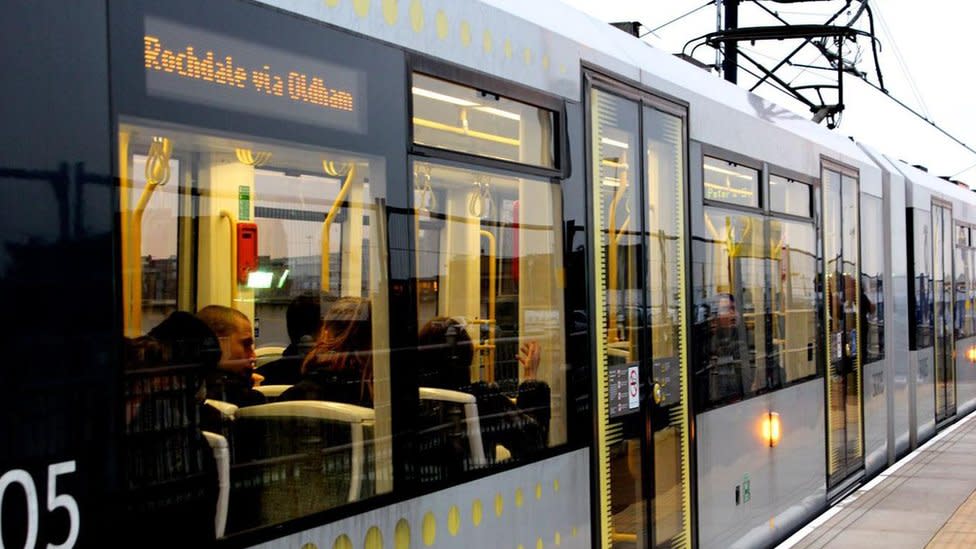Greater Manchester elections: New party adds fresh dynamic

- Oops!Something went wrong.Please try again later.
Politics here in Greater Manchester can be pretty predictable.
With less than two weeks of campaigning left, we can safely say that whatever happens at the polls on 2 May, nine of our 10 councils will continue to be run by Labour afterwards.
That's both due to the number of councillors it already has and the seats which are up for re-election this time around..
As part of the electoral cycle, only a third of seats are up for grabs.
There will usually be ups and downs for the main parties, and there's been a fair bit of excitement for the hyper-locals in recent years, but rarely has a new dynamic presented itself with such gusto so close to polling day.
Fresh from victory in one of the most eventful parliamentary by-elections in recent memory in Rochdale, there's a new party in town talking up its chances of a wider political earthquake across our patch.
After January's stomping win in the town, new MP George Galloway and his Workers Party of Britain have injected an unexpected sense of jeopardy into this year's contests.
Understandably, Rochdale is the party's main focus. Some 13 candidates are standing in the town, but it has others in Manchester and Bury and the party says it is working with other "anti-Labour" parties elsewhere to attract voters.
The main parties are hoping what happened in Rochdale was a one off, an anomaly.
Privately, Labour is confident it would have won had it not disowned its candidate over alleged anti-semitic remarks. Labour claims this gifted Galloway victory.
But it's clear Mr Galloway's policy of supporting the Palestinian cause as the Gaza conflict continues will again win him support in predominantly Muslim wards.
In Rochdale that's thought to be three or four, but Mr Galloway's also trying to widen his appeal, promising big changes at the town hall while recruiting one of his opponents in the by-election, local independent Billy Howarth, to stand as part of his team.
While the situation in Gaza is understandably important to many people, the main parties are working on the assumption that it'll be other issues that focus a majority of people's minds.
In Rochdale and beyond, Labour argues it has hard-working councillors and a good track record of running local authorities in the face of government cuts and rising costs.
In Bolton, Labour hopes to regain full control of the council after running it as a minority administration for the last 12 months.
Over in Stockport, it's the Liberal Democrats who are hoping to secure their grip on power after a couple of years of leading their own minority administration.
Sewage in the rivers continues to be one of their main campaign points, with a demand for better local NHS and dentistry services also on the door-step cribsheets.
For the Conservatives, last year's election saw them completely wiped out in Stockport and they'll be very wary of the national polls on voting intentions rolling out around here.
Understandably, they really are trying to turn residents' attention to local concerns, including protection of the greenbelt which they say Labour has failed to do with its controversial Places for Everyone plan.
'Challenge'
Meanwhile Reform UK supporters have a spring in their step following polling data suggesting it will increase its share of the vote nationally.
The party is focussing particularly on Trafford, Bolton and Wigan.
The Green Party is also quietly optimistic that it can build on the successes of recent years.
It has picked up councillors in Manchester, Tameside and Stockport, in addition to the traditionally fertile ground of Trafford.
During the last decade, hyper-local parties and independent groups have had increasing success.
Sustaining that momentum, and even keeping their gang together, has sometimes proved a challenge, though.
They will all play their part again this year, however, with the aim of giving areas often on the edge of the borough a bigger voice in council meetings.
In Salford, the elected City Mayor is effectively the council leader and there are four candidates in the running.
Across the whole of Greater Manchester, meanwhile, residents will be able to vote for the Metro Mayor.
There are six candidates standing in that election.
Voting will take place on 2 May with most council counts taking place either overnight or on Friday or Saturday. Salford's will be on Sunday.
The count for the Greater Manchester metro mayor will take place on 4 May.
Listen to the best of BBC Radio Manchester on Sounds and follow BBC Manchester on Facebook, X and Instagram? You can also send story ideas to northwest.newsonline@bbc.co.uk

